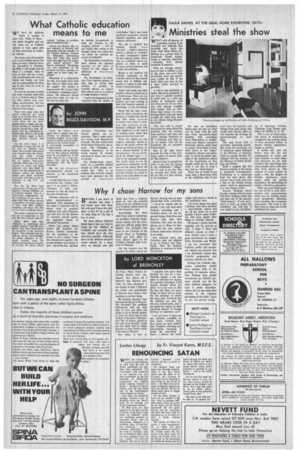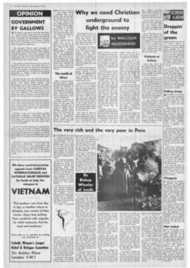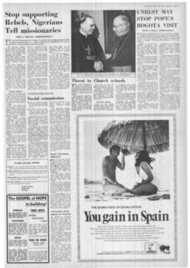Page 8, 15th March 1968
Page 8

Report an error
Noticed an error on this page?If you've noticed an error in this article please click here to report it.
Tags
Share
Related articles
Teenagers' Problems
Another Parent's View
Religious And Lay Teachers
Strike A Blow For Freedom
Why! Chose Harrow For My Sons
What Catholic education means to me
li,1VE have six children, which is enough to start with. Three of them— our eldest daughter and our two boys are at Catholic schools or have spent part of their education at Catholic schools.
My eleven year old daughter is at a non-Catholic school. But ire are many Catholics there, atmosphere is Christian, the Bible is well taught and the Head is a Catholic. Then we have an older girl who is men_ tally handicapped and away in Surrey and, finally, our baby girl, now approaching the dizzy age of one, cares for none of these things.
t is not for me then to insist th t every Catholic child must gol, to a Catholic school. There are often special, even overriding, circumstances. Nor has all our experience of convent education been happy.
'I' here were times when that senond collection was being taken up at Sunday Mass that I wondered whether it is really w rth while for the hardpéssed laity to make this particalar sacrifice or whether the priority should have been different. One has sometimes reflected upon what is told of the better bargain made in Scotland between Church and State.
On the other hand, it is chastening to learn that the 20 per cent of building costs which the Catholic community must furnish under the Education Act might average 0,500,000 a year, but the number of regular Mass-goers 2,200,000. When one takes into account the pools and bingo (whatever one may think of them!) and the contributions of religious orders, the burden, despite past debts, compares favourably with that borne by Catholics in the U.S. and Australia.
Nor has the effort been u4uccessful-67 per cent of all baptised Catholic children are in Catholic schools. This is a rer(iarkable achievement, for the remaining 33 per cent incl i.t' e both those whose parents or uardians, for good reasons, or bad, send their children elsewhere, and those who live to far from a Catholic school. 1
The means required are thus not out of proportion to the end. But why Catholic schools?
Adam Bede said that "Religion is something else besides notions," and the nonliterary may have come across the quotation in the Newsom Report. This valuable and fascinating survey acknowledged the potent influence of corporate worship upon the spiritual development of pupils.
In worship the whole school 1 realized "perhaps as nowhere else its essential unity."
Indeed, the Report tells us, new entrants to industry had frequently told the member of the Central Advisory Council for Education interviewing them that "what they missed most now they had left school was school prayers." The Report continued: "Reviewing our own experience of the evidence we have received, we ought not to have been surprised."
Education is a preparation for life. It is much more than that. Man is "little lower than the angels." His destiny is supernatural. He is more than a producer, a consumer and a citizen. His education should make him ready not only for life but for after life.
Surely the believer must agree that a system and curriculum of education which excludes religion—as in Cornmunist countries and the public schools in the United States — is profoundly incomplete, if nothing worse.
The Catholic will go further and say that religious teaching must be an expression of the truth and not of a cosy consensus. Nor will he identify Christianity with "the Christian ethic."
But do not separate denominational schools run contrary to the ecumenical movement?
I would reply that it is a false ecumenism that violates truth and it is an insult to fellowChristians of other communions to trim the truth for the sake of bonhomie.
Christian education will be either denominational o r deformed. Free ecumenism in the realm of education will be shown forth in practical solidarity with other Christians and with Jews for the defence of voluntary schools against the aggressive chains of atheistical "humanism."
There are places where neither the Anglican nor Roman Catholic community has the population or the money to run a school. There they should work together. (We should similarly save money in poor out-of-the-way parishes
by seeking arrangements to hold our services in the Anglican church — and let any Papist who winces at the thought reflect that often that was where his spiritual ancestors worshipped!)
The Ecumenical Council has itself refused the ignorant equation of the spirit of Vatican H with sloppy indifference to doctrinal integrity.
The Declaration on ChricIlan Unity reminds parents of their duty to entrust their children, if possible, to Catholic schools, to support their schools and to co-operate for their children's welfare.
I used to be impressed by the argument from the vitality of American Catholicism that Church schools are unnecessary. Then I came across two sUnreys both financed by Carnegie. The first comes from Notre Dame University, the second, "the Education of Catholic Americans," is by Father Andrew M. Greeley and Peter H. Rossi, who is not a Catholic.
The Greeley-Rossi report, based on a carefully selected sample of 3,400 people, concluded that "there is no evidence that Catholic schools have been necessary for the survival of American Catholicism." But it also found significant association between Catholic education and adult religious behaviour.
Nor did it establish that Catholic schools were "divisive" — which is almost as serious a charge as "racialist" in some "progressive" circles. On the contrary, higher education in a Catholic school appeared to them to make for more, not less tolerance, and for less anti-semitism.
Britain is not America but Catholic opponents of the Catholic school in this country would find it difficult adequately to replace it with other forms of pastoral activity.
Priests will testify that their parishes without a school are at a disadvantage. There are too many families where Catholic children can learn nothing of their faith because example, or knowledge, or love ate lacking.
Parish life has been weakened by other attractions, the pressure of modern life and the fact that many people
nowadays have more in common with workmate or professional colleague than with their neighbours in the suburb or housing estate where they sleep and pass the week-end.
Those who lightly say that religious education should be done in the parish without the school are behind the times. To use a phrase beloved of the "progressives," "we are not living in the Middle Ages" — or even in the nineteenth century. The parish today is not the spontaneous community of the past and the school which will concern so many of the parents and their families is a bond of unity in the faith which we can ill afford to do without.
blog comments powered by Disqus













